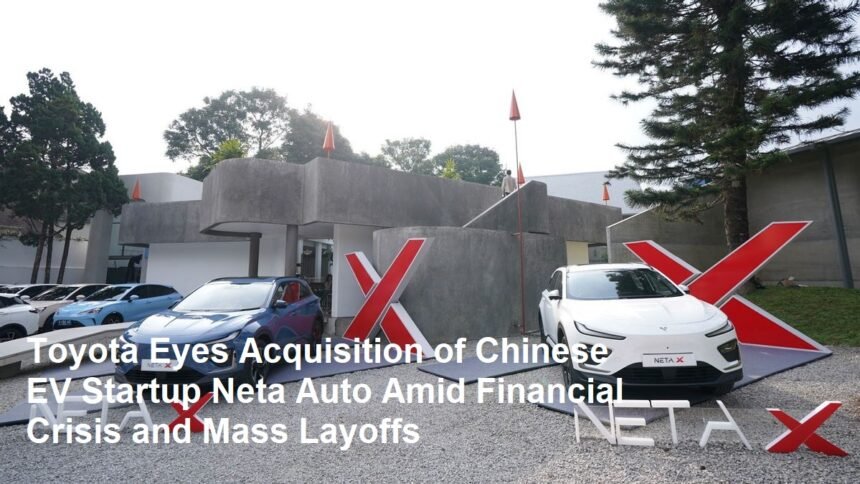On May 2025, reports have emerged that Toyota Motor Corporation, one of the world’s largest and most influential automobile manufacturers, is considering the acquisition of Neta Auto, a Chinese electric vehicle (EV) startup currently facing a severe financial crisis and undergoing mass layoffs. This potential acquisition reflects broader trends in the global automotive industry, where established players are seeking strategic partnerships and expansions to strengthen their positions in the rapidly evolving electric vehicle market.
Neta Auto, founded in recent years as part of China’s burgeoning EV sector, quickly gained attention for its innovative designs and competitive pricing aimed at the domestic market. However, despite early promise, the company has recently encountered significant financial difficulties. Reports indicate that Neta Auto has been struggling with cash flow problems, declining sales, and operational challenges exacerbated by a highly competitive market environment and broader economic pressures. These issues have led to mass layoffs, signaling a critical juncture for the company’s survival and future prospects.
Toyota’s interest in acquiring Neta Auto can be understood within the context of its global strategy to accelerate its electric vehicle offerings and expand its footprint in China, the world’s largest automotive market. While Toyota has historically been a leader in hybrid technology, it has faced increasing pressure to ramp up its fully electric vehicle portfolio to meet tightening emissions regulations and shifting consumer preferences. Acquiring a local Chinese EV manufacturer like Neta Auto would provide Toyota with valuable market access, local expertise, and a ready-made product lineup tailored to Chinese consumers.
The potential acquisition also aligns with Toyota’s broader ambitions to enhance its competitiveness against both traditional automakers and new entrants in the EV space, including Tesla and other Chinese startups such as BYD and NIO. By integrating Neta Auto’s technology, manufacturing capabilities, and distribution networks, Toyota could accelerate its development and deployment of affordable electric vehicles in China and potentially other markets.
From Neta Auto’s perspective, the acquisition could offer a lifeline amid its financial turmoil. Backing from a global giant like Toyota would provide much-needed capital, operational support, and credibility, helping to stabilize the company and preserve jobs in the long term. It could also enable Neta Auto to leverage Toyota’s extensive research and development resources, supply chain efficiencies, and global brand recognition.
However, the acquisition process is likely to be complex and subject to regulatory scrutiny, especially given the geopolitical sensitivities surrounding foreign investments in China’s strategic industries. Both companies would need to navigate challenges related to intellectual property, technology transfer, and compliance with Chinese government policies aimed at fostering domestic innovation while managing foreign influence.
The broader automotive industry is currently undergoing a profound transformation driven by electrification, digitalization, and sustainability goals. Traditional automakers are under pressure to innovate rapidly while managing costs and shifting consumer demands. Strategic acquisitions and partnerships have become common tools to accelerate growth and secure competitive advantages. Toyota’s move to acquire Neta Auto fits this pattern, reflecting a pragmatic approach to adapting to a fast-changing market landscape.
Moreover, the situation highlights the volatility and risks inherent in the EV startup ecosystem. While many new entrants have attracted significant investment and generated excitement, sustaining long-term profitability remains a challenge amid intense competition and high capital requirements. Neta Auto’s financial struggles underscore the difficulties faced by smaller players in scaling operations and achieving market penetration.
In conclusion, Toyota’s reported plans to acquire Neta Auto amid the latter’s financial crisis and mass layoffs represent a significant development in the global electric vehicle industry. The deal, if finalized, could strengthen Toyota’s position in China and accelerate its EV ambitions while providing Neta Auto with a crucial opportunity to overcome its current challenges. This potential acquisition exemplifies the dynamic and often turbulent nature of the automotive sector’s transition toward electrification and sustainability. Both companies, along with industry observers, will be watching closely as this story unfolds, with implications for market competition, innovation, and the future of mobility.









